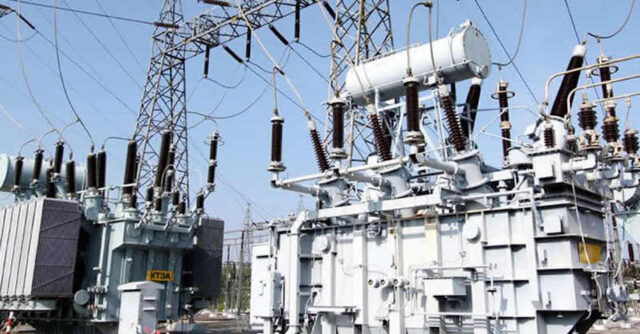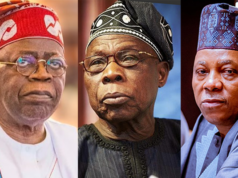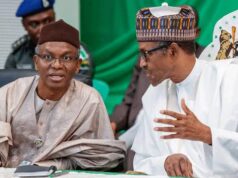Nigeria’s national electricity grid suffered another collapse yesterday, throwing the country into darkness.
THISDAY learnt that the latest grid collapse occurred at 2.09 pm, marking the 12th of such system breakdown in 2024.
The grid collapse occurred on same day the Minister of Power, Chief Adebayo Adelabu, assured Nigerians that the country’s power grid would achieve significant stability with the completion of phase one of the Presidential Power Initiative (PPI), also known as the Siemens project.
Also yesterday, the Forum of Commissioners of Power and Energy in Nigeria expressed deep concern over the frequent grid collapses plaguing the national electricity supply chain.
This was as the Chairman of the Senate Committee on Power, Senator Enyinnaya Abaribe, blamed substandard electrical materials for partly responsible for the incessant national grid collapses in the country.
A tweet via the official handle of Nigeria’s National Grid confirmed that the grid collapsed at about 2:09 pm yesterday.
“The major grid setback has occurred and the restoration is to commence,” the handler wrote.
Some of the distribution companies (Discos) confirmed the development in separate notices to their customers via their X handles.
For instance, Jos Disco in its statement, noted that the grid collapsed around 1:33 pm, leading to the loss of power supply to its feeders.
“We hope to restore normal power supply to our esteemed customers as soon as the grid supply is restored back to normalcy,” Head of Corporate Communications at Jos Disco, Dr. Friday Elijah, stated in the notice to customers.
Eko Disco also confirmed the grid collapse in its power update to its customers, posted on its X handle.
The company stated, “Dear valued customer, kindly be informed there was a reported case of system disturbance on 11th December, 2024 at 13.32hrs which has resulted to a loss of power supply across our networks.
“We are currently working with our partners as we hope for speedy restoration of the grid. We will keep you updated as soon as power supply is restored. Kindly bear with us.”
Ikeja Electric also informed its customers of the grid collapse in a statement posted on X.
“Dear esteemed customers, please be informed that we experienced a system outage today 11 December, 2024 at 13.32hrs affecting supply within our network.
“Restoration of supply is ongoing in collaboration with our critical stakeholders. Kindly bear with us.”
Also informing its customers, Abuja Disco wrote, “Dear esteemed customers, we wish you inform you that a system occurred on the national grid at 13.32pm today causing power outage across our franchise areas.
“While the gradual restoration of power supply has commenced, be assured that we are coordinating closely with relevant stakeholders to restore power fully as soon as the grid is stabilised.”
The cause of the grid collapse was yet to be made known as the Transmission Company of Nigeria (TCN) was yet to provide such information as of the time of filing this report.
Meanwhile, Adelabu assured Nigerians that the country’s power grid would achieve significant stability with the completion of phase one of the Siemens project.
Speaking yesterday, after a closed-door meeting with German officials during the visit of German President Frank-Walter Steinmeier to the State House, Abuja, the Minister stressed the reasonable progress being made under the bilateral energy partnership between Nigeria and Germany.
Adelabu disclosed that the pilot phase of the project, which started after the signing of an agreement at COP28 in Dubai in December 2023, was nearing completion.
According to him, 10 power transformers and 10 mobile substations have been imported, installed, and mostly inaugurated, adding 750 megawatts to the transmission grid’s capacity.
The remaining units are expected to be inaugurated before the end of year 2024, further increasing the grid’s capacity by an additional 150 megawatts.
The Minister emphasised that the pilot phase’s success has laid the groundwork for the commencement of phase one, which includes the rehabilitation of 14 existing substations and the establishment of 23 new substations across the country.
He explained that the commercial aspects of the initial batch of phase one have been finalised, pending a no-objection approval from the Bureau of Public Procurement (BPP) and subsequent presentation to the Federal Executive Council (FEC).
Adelabu stressed the importance of the Siemens project in addressing the fragility of Nigeria’s outdated and dilapidated grid.
He was optimistic that the planned interventions would transform the grid, ensuring long-term stability and reliability in power supply.
“The name of the game now is about cooperation, collaboration and partnership and the flagship of this bilateral relationship has to do with what we call the Siemens project, which is our PPI, where Siemens is actually implementing the brownfield and greenfield transmission substations of the PPI.
“Since the signing of the agreement in Dubai at COP 28 in December 2023, we have made significant progress. We have completed the pilot phase of this project, up to 80 percent.
“This involves the importation, the installation and commissioning of 10 power transformers and 10 power mobile substations; they’ve been imported, they’ve been installed, and lots of them have been commissioned. We have just about two left to be commissioned before the end of the year.
“The positive impact of this is that it has added nothing less than 750 megawatts to our transmission grid capacity, which is why the relative stability that we are seeing in the grid today is the direct positive impact of the pilot stage completion.
“We believe that before end of the year, additional 150 megawatts capacity is going to be added upon completion of the entire pilot phase.
“So we are officially entering into the phase one stage of this project, which involves rehabilitation of 14 brownfield existing substations and the establishment of 23 new greenfield stations across the length and breadth of this country.
“So the first stage or Batch 1 of this phase one stage has already been concluded in terms of the commercials. What we’re expecting now is a no-objection approval from the Bureau of Public Procurement, after which I’m going to present it at FEC,” he explained.
Speaking further, he said: “Once presented at FEC, and we will finalise the financing arrangement, enter into the phase one. We are quite confident from the satisfaction that we got from the completion of the pilot stage.
“When we are done with the phase one project in the transmission, the entire grid will not remain the same, and that’s why we are telling Nigerians that this is a very old grid. It’s quite fragile and it’s dilapidating.
“We need to revamp the entire grid for us to be sure of stability going forward. That is the Presidential Power Initiative.”
Adelabu further reaffirmed Nigeria’s commitment to achieving net-zero emissions by 2060, emphasising the role of renewable energy in the country’s energy transition plan.
He highlighted Nigeria’s renewable energy potential and ongoing collaboration with Germany.
He noted that Nigeria’s abundant natural resources, including over 10 hours of daily sunshine across 30 states, desert and coastal winds, and more than 300 underutilised dams, present vast opportunities for renewable energy development.
The Minister stressed that Germany’s advanced technology, combined with Nigeria’s natural advantages, provides a strong foundation for energy transformation.
Highlighting new infrastructure developments such as the Lagos-Calabar coastal highway and the Badagry-Sokoto road, Adelabu explained that these projects would enhance access to renewable energy resources, including offshore wind and hydroelectric power from previously inaccessible dams.
He also outlined plans to implement a distributed power model, which would enable each of Nigeria’s 36 states and the Federal Capital Territory to have localized power generation.
This approach, the Minister said, would shield states from disruptions on the national grid while ensuring expanded energy access, particularly in rural areas and isolated institutions such as schools and hospitals.
While no new agreements were signed during the meeting, the Minister said discussions focused on accelerating the implementation of existing agreements under the bilateral energy partnership.
In the meantime, the Forum of Commissioners of Power and Energy in Nigeria, yesterday expressed deep concern over the frequent grid collapses plaguing the national electricity supply chain.
The Chairman of the Forum, Eka Williams in statement stated, ”Today’s incident underscores the urgent need for sustainable and decentralised solutions to ensure uninterrupted power supply for all Nigerians.”
Speaking on behalf of the Forum, the Chairman further stated: “The recurrence of grid collapses disrupts lives and businesses, creating far-reaching economic and social consequences.
“As Commissioners of Power and Energy from across Nigeria, we are united in addressing this challenge with pragmatic and state-driven solutions.”
The Chairman highlighted some of the key outcomes and recommendations from the Forum’s recent meeting to include: “States are intensifying efforts to establish and operationalise state electricity markets as a critical step toward decentralising the power sector.” This approach, he said allows states to enhance generation, transmission, and distribution infrastructure tailored to their unique needs.
On enhancing grid stability, the Commissioners advocated for the development of grid systems within their territories to complement the national grid.
According to the forum, ”This approach enhances localised reliability and reduces the cascading effects of a grid collapse. While pursuing decentralisation, states are advocating for collaborative measures with the federal government to stabilise the national grid. “This includes investments in modern grid technology, predictive maintenance and real-time monitoring systems.”
The forum’s chairman stated that: “State governments have stepped in with immediate interventions such as deploying alternative power solutions for critical infrastructure, including hospitals, schools, and water facilities. Commissioners reaffirmed their commitment to ensuring that no community remains entirely in the dark during such crises.
“It is time to embrace a decentralized electricity framework where states have the autonomy and resources to manage their power needs effectively. Together, we can overcome the current challenges and build a more reliable and equitable power sector for Nigeria,” the Chairman concluded.
However, the Chairman of the Senate Committee on Power, Senator Enyinnaya Abaribe, has blamed substandard electrical materials as being partly responsible for incessant national grid collapses in the country.
Abaribe spoke in Abuja at the 4th edition of the: “Stakeholders Roundtable for the Legislature and Judiciary on the Enforcement of Technical Standards, Regulations, and the Mandate of the Nigerian Electricity Management Services Agency (NEMSA).”
Abaribe stressed the need to focus on optimising executive, legislative, and judicial roles in enforcing technical standards and regulations in Nigeria’s electricity sector.
“It is imperative to note that this roundtable is being organised by NEMSA at a time when the use of substandard electrical equipment is considered one of the major culprits of frequent grid collapse in Nigeria,” the lawmaker said.
He added that it has been widely reported that the Economic and Financial Crimes Commission (EFCC) had discovered through its investigation that the use of substandard electrical equipment and materials have become a major unwholesome practice by contractors in the power sector.
With the decentralisation of electricity regulatory responsibilities ushered in by the new Electricity Act, he argued that the challenge of enforcing electrical standards and safety at the sub-national levels of government may even become more daunting for NEMSA.
“Given the enormity of NEMSA’s mandate in enforcing electrical standards and ensuring our safety, the regulator, contractors, operators/licensees, customers and other critical stakeholders need to support NEMSA to deliver on this mandate,” Abaribe said.
Also speaking, the Chief Executive Officer of NEMSA Aliyu Tukur, said the event organised by NEMSA was a critical step in the collective journey towards ensuring the safety, reliability, and sustainability of Nigeria’s electricity supply industry.
He explained that NEMSA will continue to execute its mandate of ensuring that all electrical installations, networks, and systems are safe, efficient, and compliant with prescribed standards, with the support of the legislature and judiciary.
Tukur stated that the roundtable aimed to foster deeper collaboration, enhance mutual understanding, and identify actionable strategies for addressing the legal and regulatory challenges that impede the enforcement of technical standards.
Specifically, to achieve this, he stated that there was the need for strengthening legal frameworks to support NEMSA’s mandate and address judicial processes that affect compliance enforcement.
Besides, Tukur said it called for enhancing stakeholder awareness of technical standards and regulations, and exploring legislative solutions to emerging issues in the electricity sector.
Adelabu, who was represented by the Permanent Secretary, Federal Ministry of Power, Mamuda Mamman, who also had Ochanya Ofoma stand in for him, said the event was a crucial step towards deepening awareness as well as fostering compliance with approved standards and regulations in the country.
Adelabu said this would not only advance the reliability and sustainability of Nigeria’s energy systems but also safeguard the lives and investments of all stakeholders in the power sector.
He added that the government remains steadfast in its commitment to creating an enabling environment that supports innovation, investment, and growth within the Nigerian Electricity Supply Industry (NESI).







